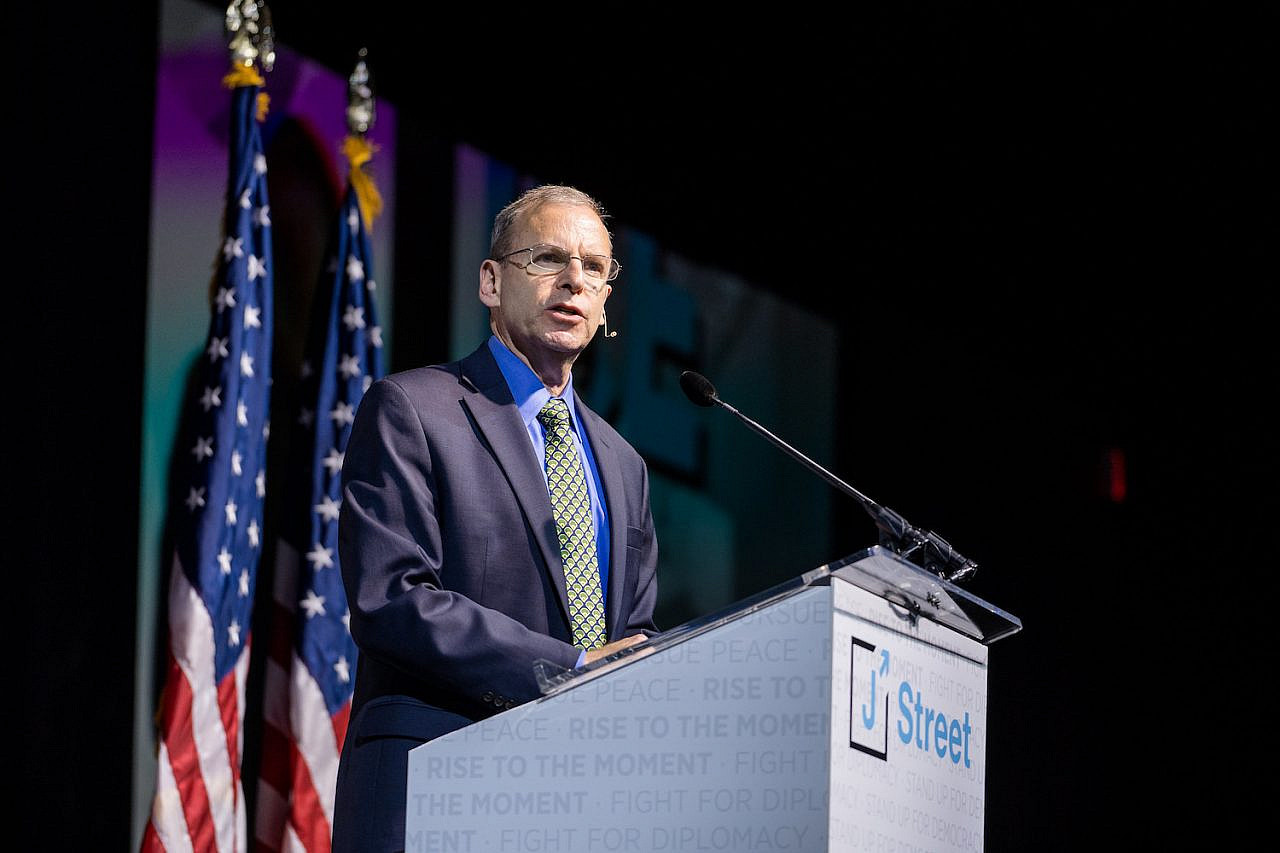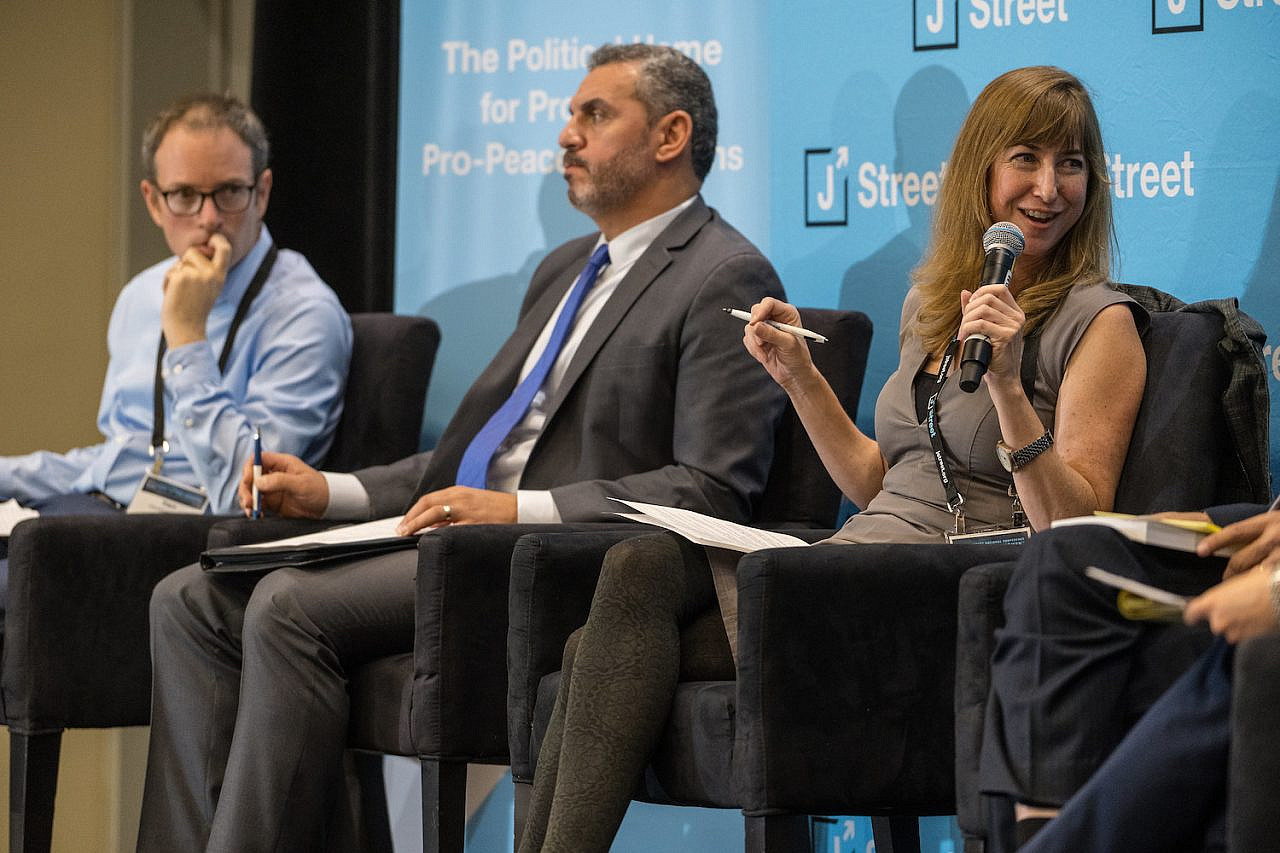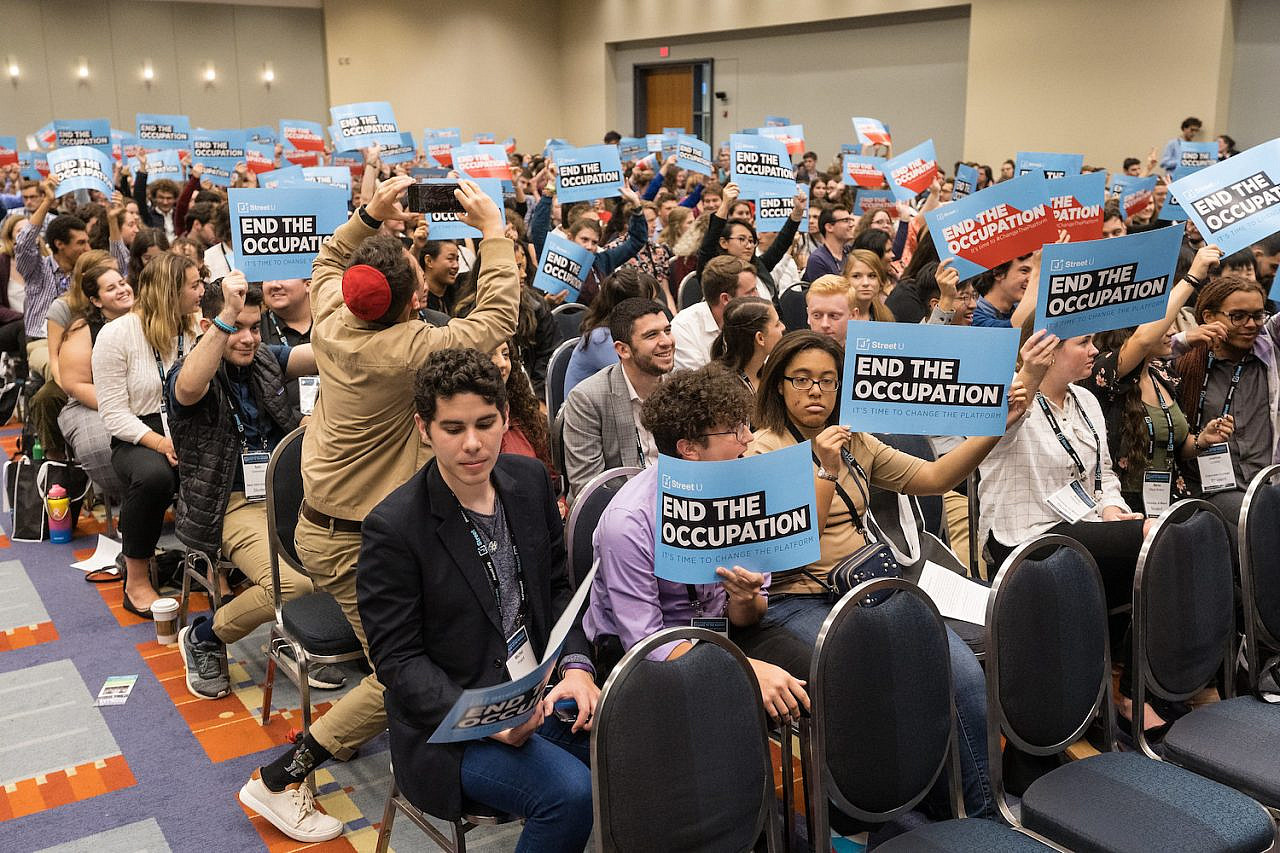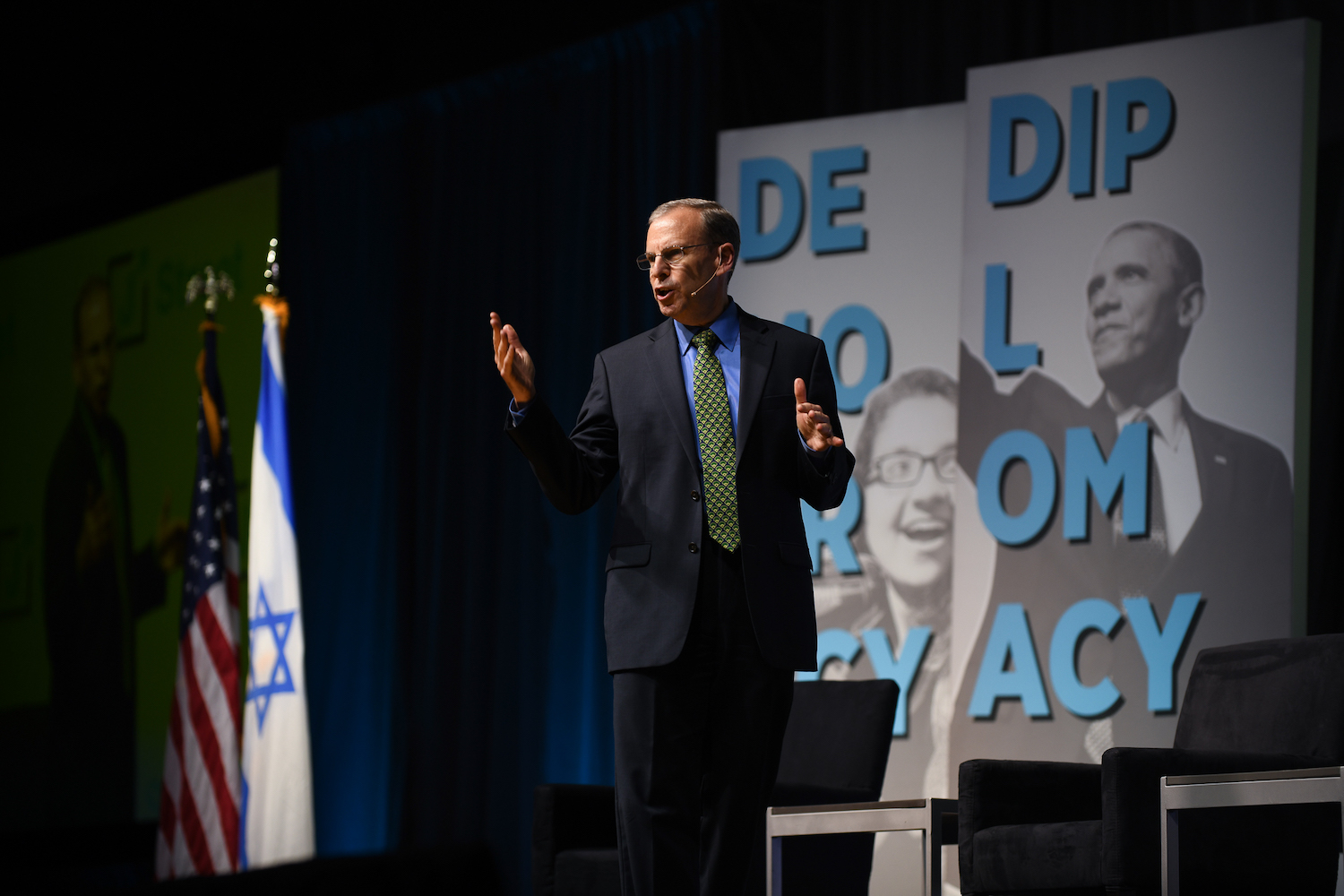When J Street was founded in 2007, it aimed to be a home for America’s “pro-Israel, pro-peace” community by dedicating itself to advancing a two-state solution while also denouncing the Israeli occupation and settlement expansion. Fourteen years later, the lobby group has established itself as a major institution in Washington, influencing lawmakers on Capitol Hill and attracting powerful keynote speakers to its annual conference. Yet as Israel’s policies of occupation and annexation deepen, the goal of partitioning the land and establishing a Palestinian state is nowhere in sight.
Now it appears J Street may be adjusting to the realities on the ground — and could be ready to let go of the classic two-state formula. But this shift has involved internal debates over several years, highlighting the organization’s relative conservatism on political solutions to the conflict.
J Street is set to use its national conference this year, which will convene virtually on April 18-19 with an array of high-profile American, Israeli, and Palestinian politicians and leaders, to outline the principles and policies it hopes the Biden administration will pursue to reignite peace efforts in the Middle East. According to J Street President Jeremy Ben-Ami, that includes a robust discussion on a potential new way forward: an Israeli-Palestinian confederation.
“We’re not getting anywhere in the traditional concepts, so perhaps having these conversations will break some of these log-jams,” Ben-Ami told +972 Magazine. “I see [confederation] as a really creative extension of the two-state discussion that’s getting past some of the limitations that may have prevented us from getting to a solution.”
Although the confederation model shares basic tenets with the two-state approach, its most ardent proponents envision a starkly different outcome. The framework mirrors that of the European Union, in which the citizens of loosely associated states — in this case, Israel and a future Palestine — would enjoy freedom of movement, porous borders, some form of cross-country residency rights, and a shared capital in Jerusalem. It would incidentally grant Palestinian refugees living in the West Bank and Gaza the right of return and to become permanent residents inside the State of Israel, while avoiding a mass evacuation of Israeli settlers in the West Bank by allowing them to become residents in a Palestinian state.
Proponents argue that confederation would change the nature of the intractable conflict from one concerned with human rights and national self-determination to one centered on civil rights and economic equity.
Playing defense
Since its founding, J Street has significantly shifted what the mainstream Jewish community considers to be acceptable discourse surrounding Israel, helping to divorce criticism of the occupation and the Israeli government from accusations of antisemitism.
The lobby group has also lent political cover to Democratic lawmakers looking to oppose Israel in pursuit of certain policy goals, such as the Iran nuclear deal, which was a top priority during President Barack Obama’s second term. J Street quickly squelched accusations of antisemitism and threw its weight behind the deal, flexing its political muscles against the American Israel Public Affairs Committee (AIPAC), a powerful pro-Israel lobby group that opposed the agreement.
Since then, however, J Street has been hesitant to wholeheartedly endorse thorny policy issues, such as conditioning U.S. aid to Israel. For many Palestinian rights groups and activists, this sluggishness — combined with a firm anchoring in liberal Zionist discourse — has left J Street far behind the positions of many progressives, including Democratic representatives in Congress. When Rep. Betty McCollum of Minnesota, for example, introduced a bill seeking to withhold U.S. military financing over Israel’s abuse of Palestinian childrens’ rights, J Street did not endorse it. The result, as Yousef Munayyer argued in an op-ed for +972 Magazine, is that J Street has been “[w]ittingly or unwittingly… pushing away the goalposts to stave off real accountability.”

During the Trump administration, J Street largely played defense, dedicating its efforts to slowing down de jure annexation and combating domestic antisemitism. All the while, the organization, like many in the international community and Democratic Party, has remained wedded to a two-state solution. This was despite a growing understanding among activists and analysts — including within J Street itself — that creeping annexation and illegal settlement expansion, coupled with Israel’s near-total military control over Palestinian society, have rendered partition a fantasy.
“My view is that the reality on the ground makes it impossible to achieve a two-state solution,” said one J Street staff member, who spoke on the condition of anonymity for fear of reprisal. “There are people on staff for whom a two-state solution is the only way, but I think there is a sizable proportion of staff members who recognize that this solution is increasingly infeasible given the permanency of the military occupation.”
However, Matt Duss, foreign policy advisor to Sen. Bernie Sanders, said it’s strategic to pivot the conversation in the United States toward addressing human rights issues in Israel-Palestine when a final resolution is nowhere in sight.
“There can be a danger of letting discussions of an outcome — whether two states or confederation — crowd out discussions of the fundamentally undemocratic one-state reality that exists today,” said Duss. “[J Street has] shifted their role at various times in response to shifts in the political environment. For example, after Trump was elected, J Street recognized — quite rightly, in my view — that there was a need for an organization like them to play a larger role as a gathering place for progressives to address broader issues of antisemitism and rising ethnonationalism and authoritarianism.”
Sandra Tamari, executive director at the Adalah Justice Project, said she welcomes J Street’s “movement away from a dead-end partition plan and we hope they will continue to move in a direction that calls for the end of Jewish supremacy inside of Palestine and Israel.”
But she cautioned that any viable political solution depends on a recognition and accounting of the unequal distribution of power that deprives Palestinians of human and civil rights.

“If Palestinians are continually being forced to negotiate their existence with much more powerful actors like the Israeli government or even Israelis then there’s very little room for meeting those principles.”
More harm than good
As Israel’s military occupation slides into its 54th year, many fear that clinging to the two-state plan could do more harm than good.
“The left is really fed up with talking about solutions they know can never go anywhere,” said Dr. Dahlia Scheindlin, a public opinion expert and an international political and strategic consultant who is scheduled to speak at the J Street conference next week. (Full disclosure: Scheindlin is a +972 co-founder and contributor, and was not involved in reporting or editing this story.) “They know it weakens them politically. They know it’s bad for the goal of ending occupation. So they’re struggling for other approaches that seem more feasible.”
Accordingly, observers increasingly fear that J Street’s two-state advocacy is futile at best and, at worst, lends political cover to Israel’s gradual annexation of the West Bank, which has created and entrenched a one-state reality. The concern is that the two-state approach is not only increasingly far-fetched, but also morally dubious. “What it really means is we’re supporting ethnic segregation,” said Scheindlin.
Atalia Omer, a professor of Religion, Conflict, and Peace Studies at the Kroc Institute for International Peace Studies at the University of Notre Dame, said this kind of “segregationist logic” is no longer acceptable to many American Jews on the left who have become politicized on issues of race and equity, particularly as it relates to the marginalization of Mizrahi Jews and Jews of color.
“Increasingly [there’s] a cognitive dissonance that American Jews feel — especially but not only younger generations — because they are so embedded in anti-racism and being self-critical,” she said. “For many people that I’ve interviewed and engaged with in the movement, they felt that they just couldn’t be committed to anti-racism in the United States and also [be] Zionist in an undeconstructed way.”
Omer said that the way that J Street chooses to approach confederation will say a lot about the reasons for its shift. “What’s the source of the enthusiasm? Does the confederation idea address questions regarding historical injustices? Or is it another form of erasure of Palestinian experiences and grievances?” she said. “An organization like J Street [doesn’t] really interrogate the legacy of Zionism with respect to Palestinians… it just kind of offers a variation that is more, I guess, swallowable than AIPAC.”

Ben-Ami, meanwhile, said he is hoping to use his platform at the conference — which annually attracts thousands of attendees, organizations, and politicians — to amplify the discussion of confederation. “We want to create an environment in which it is an acceptable part of the dialogue, so that the concept begins to be in the mainstream conversation about what a two-state resolution to this conflict looks like,” he said. “It doesn’t have to be a hard separation; it can actually be more of a confederated model.”
While Ben-Ami said he considers an open discussion of the approach as a natural progression of the two-state solution, some former staff members see it as a departure from the party line. Eva Borgwardt, who served as the president of J Street’s national student board from 2018 to 2019, said that she became interested in exploring a confederation during her tenure with the group.
“At the time, when it was brought up in conversations within the organization, I remember a stance that ‘borders mattered’ and were a necessary condition of any final status agreement,” she said. “The idea that this would be a real conversation within the organization does feel like a shift.”
‘Divide and share’
Activists who have long championed the confederation model likewise see this move as a departure for J Street. Meron Rapoport, an Israeli journalist and editor at +972’s sister site Local Call, along with Palestinian activist Awni Al-Mashni, have been advocating for confederation for over a decade through a movement the duo founded called A Land For All, now the leading organization advocating for a confederation in Israel-Palestine, and whose model will form the basis for J Street’s discussions at the conference. Rapoport, who is slated to speak at the event for the first time, said he attended in 2018, but was not given the microphone. (Rapoport was not involved in reporting or editing this story.)
“They were so hesitant that we were not given the opportunity to speak from the floor,” he said. “They were very much orthodox with the two-state solution, and any idea that may seem to jeopardize the two-state solution, well, they felt they are the guardians of the two-state solution.”
A spokesperson for J Street confirmed that Rapoport did not speak during the 2018 conference, but said it was due to programming logistics and not ideological opposition.

A Land For All’s “two states, one homeland” vision is predicated on three core tenets: firstly, independence, wherein Israel and Palestine will be two sovereign, democratic states with full control of their territories, with the Green Line as the border; secondly, mutual respect and recognition of the connection that both Palestinians and Israeli Jews feel to the entire land, with a commitment to an open territory in which citizens of both countries can travel, work, and live anywhere; and thirdly, partnership, with Israel and Palestine establishing a shared “superstructure” to manage joint institutions that address security, environmental protection, and civil and economic rights, among other shared arenas of society.
Dr. Said Zeedani, who recently retired from teaching as a professor of philosophy at Al-Quds University, and who helped draft A Land For All’s platform, calls it the “divide and share” approach. “If you are talking about two states, then you have a problem of Jerusalem, then you have the problem of settlement and settlers, then you have a problem of the refugees,” he said. “You can divide a country into two states, but there are things that cannot be divided, so we should think about sharing them.”
Zeedani began thinking about this model in the early 2000s as the Oslo peace process was falling apart and the Second Intifada was underway. Around 2012, he was connected with Rapoport, who, along with Al-Mashni, had started convening discussion groups to imagine alternatives to the two-state proposal.
“I came to understand that, on the one hand, the classic two-state solution is failing and something was missing, mainly regarding the [Palestinian] refugees,” Rapoport said. “We started to meet — Israeli friends, Palestinian friends — and then we started this movement later on.”
“The whole concept starts with the idea that the two people are fundamentally equal and that the two political entities are fundamentally equal,” said Scheindlin, who became disillusioned with the two-state plan in the early 2000s and began advocating for a confederation already in 2012.

“The reality is that [Palestinians and Israelis] are not [equal], and it will take a long time until they are,” continued Scheindlin. “But one of the nice things about this approach is that it does draw on the best of the two-state solution, drops the worst, and draws also on aspects of one state without adopting the entire, total erasure of national self-determination.”
Exploring alternative models
The model of a confederation has circulated for years among scholars, analysts, and activists — often from ideologically opposed camps — but has received little political attention in Israel-Palestine, and even less in the United States. Yet, as consensus grows that the two-state solution is politically and physically unfeasible, the model has started to emerge in American public discourse. In a widely circulated essay for Jewish Currents and an op-ed for the New York Times last year, liberal American Jewish writer and thinker Peter Beinart, a once-outspoken advocate for a two-state solution, declared that vision dead, echoing a longstanding view of many Palestinians and allies. Beinart now rejects the idea that a Jewish nation-state can coexist with liberal democracy, and has instead called for an open exploration of alternative models, including confederation and a democratic binational state.
In February, American-Israeli professor and writer Bernard Avishai and American-Palestinian businessman Sam Bahour wrote an opinion piece in the New York Times calling on the Biden administration to pursue the confederation model. Both Bahour and Avishai are scheduled to speak at the upcoming J Street conference.
Prominent think tanks, including the Carnegie Endowment for International Peace, the Century Foundation, and the Brookings Institution have also published articles and hosted discussions about confederation.

Not all proponents of confederation, however, support open borders and the right of return for Palestinian refugees in the way that A Land For All envisions. Yossi Beilin, a long-time Israeli Labor Party politician who played a key role in the Oslo Accords and who has expressed support for a confederation, said there might eventually be freedom of movement if the model is implemented successfully, but certainly not at the start.
“[Palestinians] will not have the right of return. There might be a symbolic allowance to Palestinian citizens to live in Israel, but right of return means that whoever wants to live in Israel will be allowed to do that, and that will not happen,” said Beilin, who is scheduled to speak at the J Street conference. “It will not be that any Israeli who will want to live in the Palestinian state will be allowed and vice versa. There will be limits and quotas.”
Even confederation as delineated by A Land For All has garnered its fair share of critique. Experts have stressed that any political solution in Israel-Palestine needs to begin, at a minimum, with addressing the colonial root of the conflict. Ahmad Abuznaid, the executive director of the US Campaign for Palestinian Rights, called confederation “interesting” but said without “decolonizing the structures and institutions that prefer one people over another, then I’m not sure we’re going to achieve justice.”
Abuznaid pointed to Israel’s 2018 Jewish Nation-State Law, which, among other provisions, confers the right to exercise national self-determination in the land exclusively to Jewish people.
“The long term here is that Israelis and Palestinians are going to need to share the land. The two state solution framework is evaporating before our eyes and we’re in a one-state reality,” he said. “Any real courageous or visionary or responsible leader on all sides will continue to look at how both people share the land, and not necessarily how to divide and cut up the land without addressing the root causes.”

AJP’s Sandra Tamari, also emphasized her organization’s stance that “a just solution in Palestine and Israel requires first decolonization. In other words, an end to Zionist logic of supremacy, the right of Palestinians to return home, the freedom of all Palestinians to move freely, to cultivate their lands, to pursue their livelihoods, and a dismantling of economic disparities and reparations for the harm done.” The merits of a proposed solution, Tamari continued, rest on whether the “basic needs of Palestinians as the oppressed, colonized people” are met.
Rapoport said he recognizes that the colonial dimension, including Jewish supremacism, has to be dealt with. “We cannot ignore and shut our eyes and say we will return to the ‘67 border and everything will be alright. We have to deal with settler colonialism and recognize ‘48, or even go back to 1917 with the Balfour Declaration,” he said, referring to Britain’s promise to the Zionist movement to establish a Jewish homeland in Palestine.
“But I think there’s also an understanding, it seems, even among J Street, that the problem is deeper and therefore the solutions should be more comprehensive and deeper than just ending the Israeli occupation,” he added.
Ben-Ami said that even if a new, politically viable resolution emerged for the lobby group to throw its weight behind, Israel-Palestine is currently low on the Biden administration’s list of priorities.
“Whether it’s the pandemic, or the economic crisis, or the racial justice crisis, or the climate crisis — you can list out a top 10 list of burning priorities, and nowhere near that list is the Israeli-Palestinian conflict. And that applies not only to the full administration’s priority list, that’s also true in terms of foreign policy,” he said. “And if they get to this set of issues, it’s going to be to roll back some of the worst of the things that Trump did. And it’s just a long, long list of things that need to be undone.”
Ultimately, any movement toward a just resolution will require the political will of the Israeli government. Omar Rahman, a visiting scholar at the Brookings Doha Center who recently authored a report on the confederation approach, said the model might be more acceptable to Israelis if a situation emerged in which the government decided or was otherwise compelled to change course.
“But Israelis have very little incentive to give up what they have, which is essentially political control,” he explained. “Disrupting the status quo is essentially impossible, unless you can alter the balance of power, and that’s going to be an issue for any kind of solution, no matter what it is — including confederation.”
Correction, April 17, 2021: This story was updated to correct Atalia Omer’s professional title. She is a professor.

